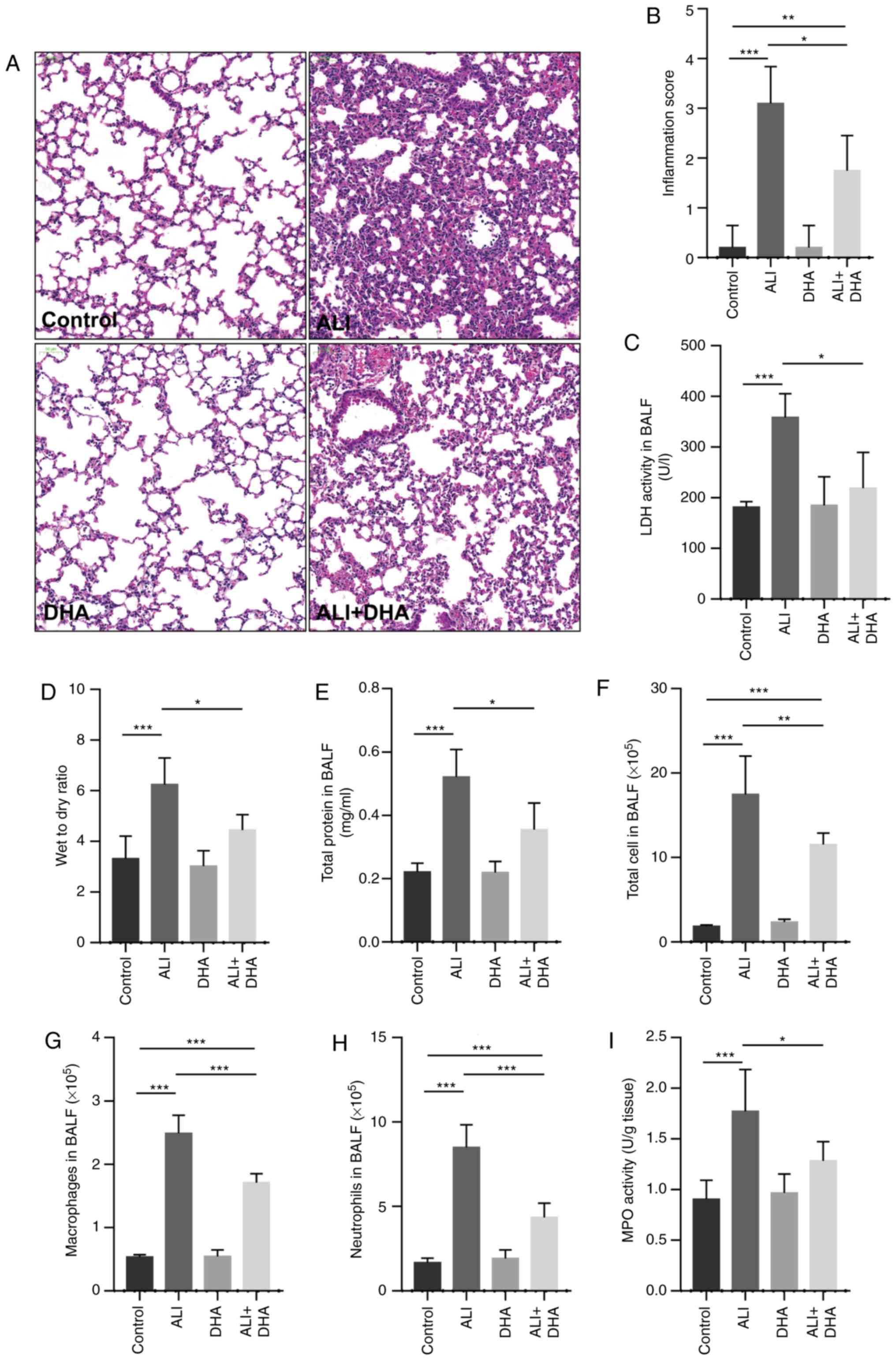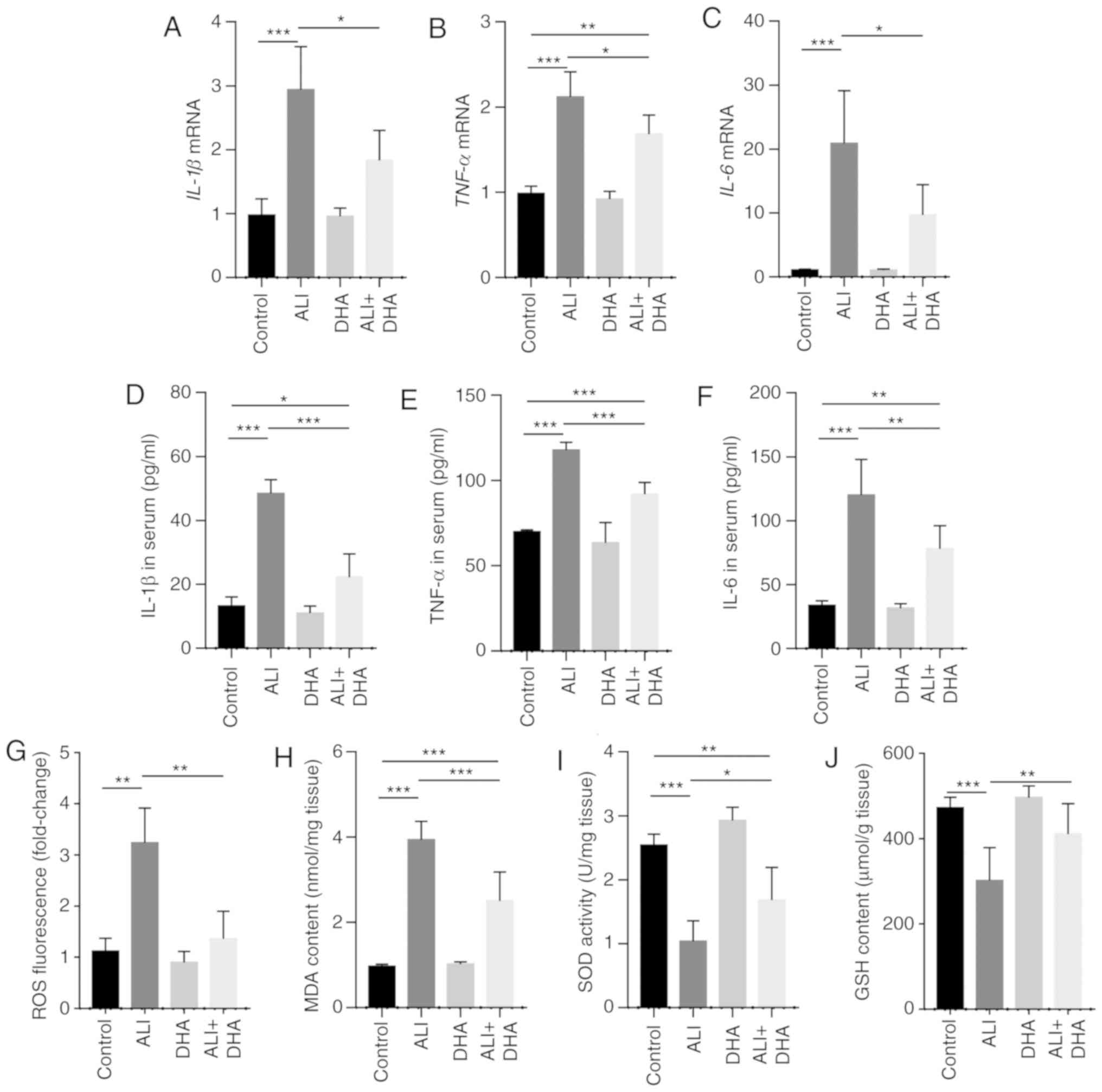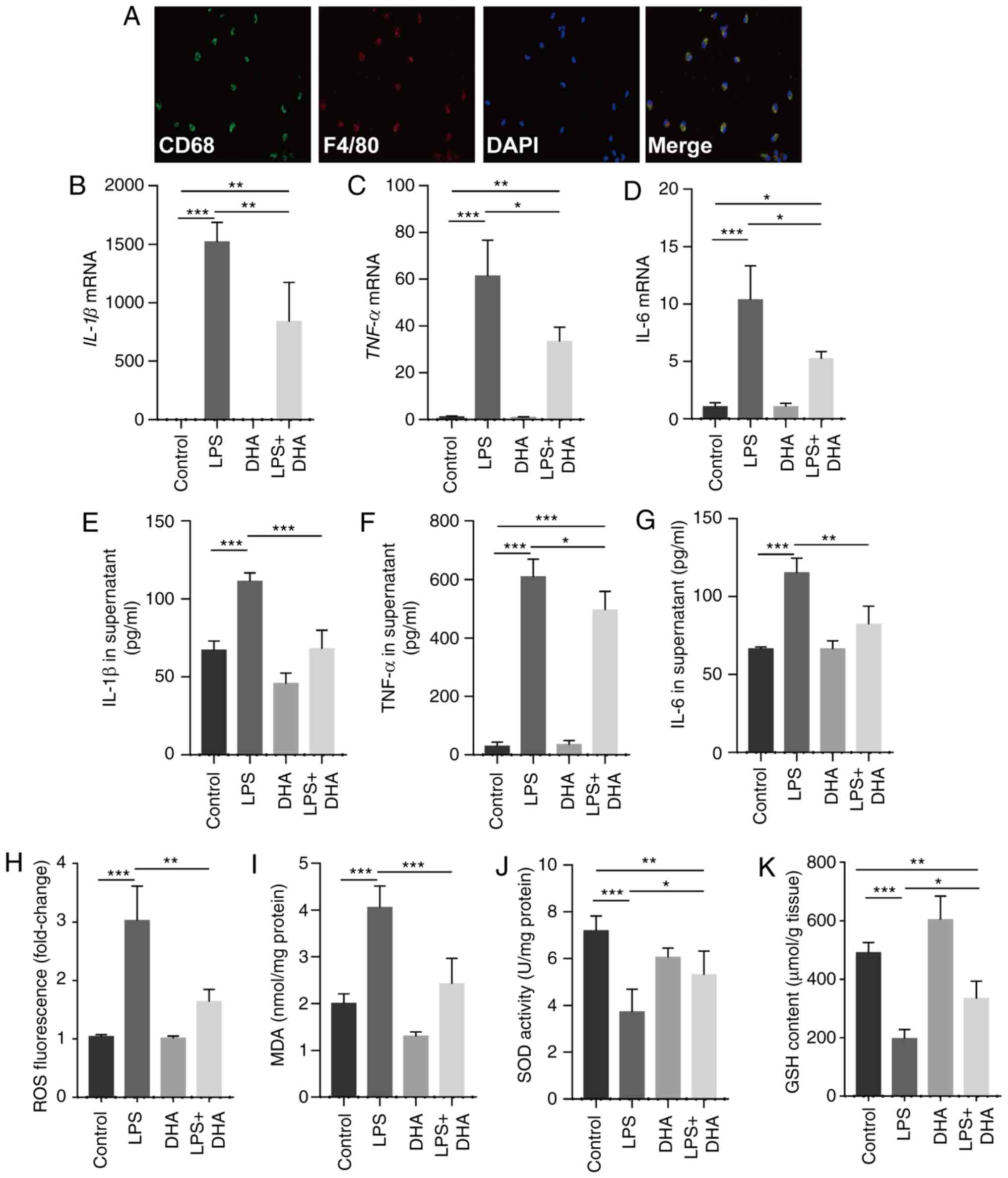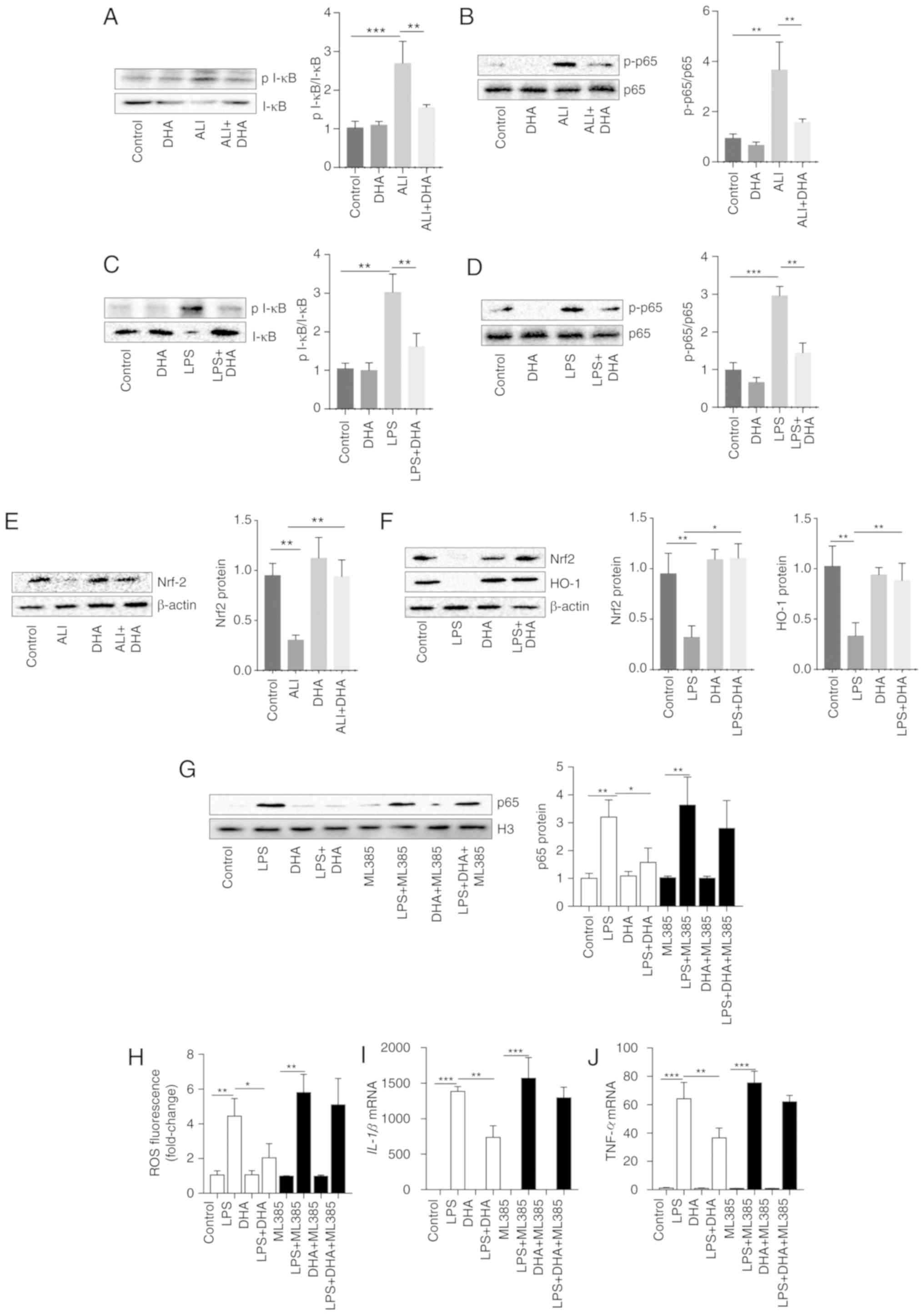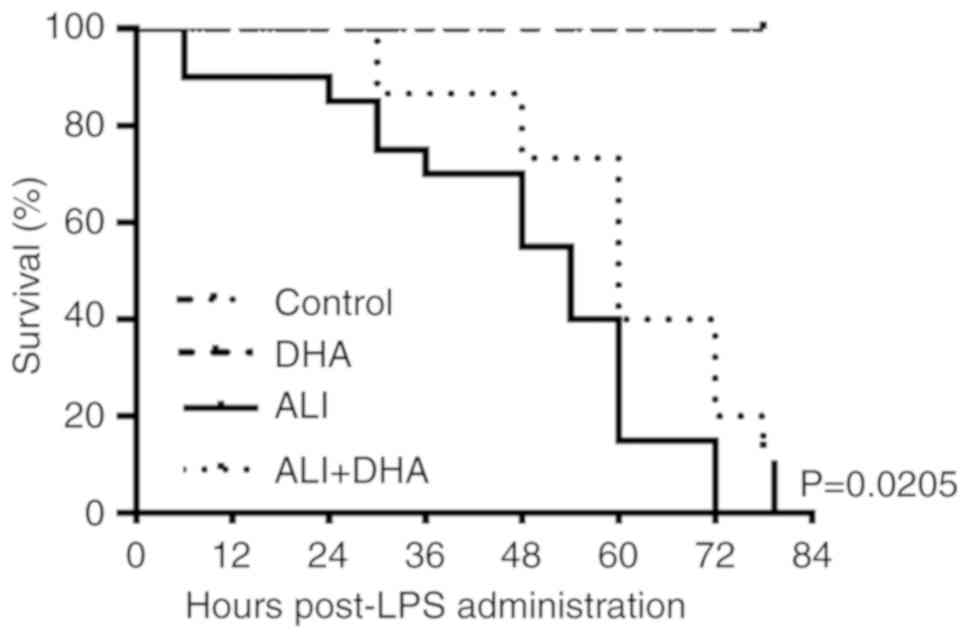|
1
|
Pan C, Liu L, Xie JF and Qiu HB: Acute
respiratory distress syndrome: Challenge for diagnosis and therapy.
Chin Med J (Engl). 131:1220–1224. 2018. View Article : Google Scholar
|
|
2
|
Han X, Wu YC, Meng M, Sun QS, Gao SM and
Sun H: Linarin prevents LPS-induced acute lung injury by
suppressing oxidative stress and inflammation via inhibition of
TXNIP/NLRP3 and-NF-κB pathways. Int J Mol Med. 42:1460–1472.
2018.PubMed/NCBI
|
|
3
|
Wu J, Yan Z, Schwartz DE, Yu J, Malik AB
and Hu G: Activation of NLRP3 inflammasome in alveolar macrophages
contributes to mechanical stretch-induced lung inflammation and
injury. J Immunol. 190:3590–3599. 2013. View Article : Google Scholar : PubMed/NCBI
|
|
4
|
Liu H, Liang X, Wang D, Zhang H, Liu L,
Chen H, Li Y, Duan Q and Xie K: Combination therapy with nitric
oxide and molecular hydrogen in a murine model of acute lung
injury. Shock. 43:504–511. 2015. View Article : Google Scholar : PubMed/NCBI
|
|
5
|
Takashima K, Matsushima M, Hashimoto K,
Nose H, Sato M, Hashimoto N, Hasegawa Y and Kawabe T: Protective
effects of intratracheally administered quercetin on
lipopolysaccha-ride-induced acute lung injury. Respir Res.
15:1502014. View Article : Google Scholar
|
|
6
|
Deng G, He H, Chen Z, OuYang L, Xiao X, Ge
J, Xiang B, Jiang S and Cheng S: Lianqinjiedu decoction attenuates
LPS-induced inflammation and acute lung injury in rats via
TLR4/NF-κB pathway. Biomed Pharmacother. 96:148–152. 2017.
View Article : Google Scholar : PubMed/NCBI
|
|
7
|
Jiang K, Guo S, Yang C, Yang J, Chen Y,
Shaukat A, Zhao G, Wu H and Deng G: Barbaloin protects against
lipopolysaccharide (LPS)-induced acute lung injury by inhibiting
the ROS-mediated PI3K/AKT/NF-κB pathway. Int Immunopharmacol.
64:140–150. 2018. View Article : Google Scholar : PubMed/NCBI
|
|
8
|
Walters DM, Cho HY and Kleeberger SR:
Oxidative stress and antioxidants in the pathogenesis of pulmonary
fibrosis: A potential role for Nrf2. Antioxid Redox Signal.
10:321–332. 2008. View Article : Google Scholar
|
|
9
|
Yan J, Li J, Zhang L, Sun Y, Jiang J,
Huang Y, Xu H, Jiang H and Hu R: Nrf2 protects against acute lung
injury and inflammation by modulating TLR4 and Akt signaling. Free
Radic Biol Med. 121:78–85. 2018. View Article : Google Scholar : PubMed/NCBI
|
|
10
|
Liu Z, Qu M, Yu L, Song P and Chang Y:
Artesunate inhibits renal ischemia-reperfusion-mediated remote lung
inflammation through attenuating ROS-induced activation of NLRP3
inflammasome. Inflammation. 41:1546–1556. 2018. View Article : Google Scholar : PubMed/NCBI
|
|
11
|
Zhao D, Zhang J, Xu G and Wang Q:
Artesunate protects LPS-induced acute lung injury by inhibiting
TLR4 expression and inducing Nrf2 activation. Inflammation.
40:798–805. 2017. View Article : Google Scholar : PubMed/NCBI
|
|
12
|
Keating GM:
Dihydroartemisinin/Piperaquine: A review of its use in the
treatment of uncomplicated Plasmodium falciparum malaria. Drugs.
72:937–961. 2012. View Article : Google Scholar : PubMed/NCBI
|
|
13
|
Morris CA, Onyamboko MA, Capparelli E,
Koch MA, Atibu J, Lokomba V, Douoguih M, Hemingway-Foday J, Wesche
D, Ryder RW, et al: Population pharmacokinetics of artesunate and
dihydroartemisinin in pregnant and non-pregnant women with malaria.
Malar J. 10:1142011. View Article : Google Scholar : PubMed/NCBI
|
|
14
|
Tu Y: The discovery of artemisinin
(qinghaosu) and gifts from Chinese medicine. Nat Med. 17:1217–1220.
2011. View
Article : Google Scholar : PubMed/NCBI
|
|
15
|
Yang DX, Qiu J, Zhou HH, Yu Y, Zhou DL, Xu
Y, Zhu MZ, Ge XP, Li JM, Lv CJ, et al: Dihydroartemisinin
alleviates oxidative stress in bleomycin-induced pulmonary
fibrosis. Life Sci. 205:176–183. 2018. View Article : Google Scholar : PubMed/NCBI
|
|
16
|
Lin SP, Li W, Winters A, Liu R and Yang
SH: Artemisinin prevents glutamate-induced neuronal cell death via
Akt pathway activation. Front Cell Neurosci. 12:1082018. View Article : Google Scholar : PubMed/NCBI
|
|
17
|
Jiang C, Li S, Li Y and Bai Y: Anticancer
effects of dihydroartemisinin on human esophageal cancer cells in
vivo. Anal Cell Pathol (Amst). 2018:87597452018.
|
|
18
|
Zhou Y, Liu T, Duan JX, Li P, Sun GY, Liu
YP, Zhang J, Dong L, Lee KSS, Hammock BD, et al: Soluble epoxide
hydrolase inhibitor attenuates lipopolysaccharide-induced acute
lung injury and improves survival in mice. Shock. 47:638–645. 2017.
View Article : Google Scholar :
|
|
19
|
Zhong WJ, Yang HH, Guan XX, Xiong JB, Sun
CC, Zhang CY, Luo XQ, Zhang YF, Zhang J, Duan JX, et al: Inhibition
of glycol-ysis alleviates lipopolysaccharide-induced acute lung
injury in a mouse model. J Cell Physiol. 234:4641–4654. 2019.
View Article : Google Scholar
|
|
20
|
Kim KH, Kwun MJ, Choi JY, Ahn KS, Oh SR,
Lee YG, Christman JW, Sadikot RT, Han CW and Joo M: Therapeutic
effect of the tuber of alisma orientale on
lipopolysaccha-ride-induced acute lung injury. Evid-Based
Complement Alternat Med. 2013:8638922013.
|
|
21
|
Suzuki K, Okada H, Takemura G, Takada C,
Kuroda A, Yano H, Zaikokuji R, Morishita K, Tomita H, Oda K, et al:
Neutrophil elastase damages the pulmonary endothelial glycocalyx in
lipopolysaccharide-induced experimental endotoxemia. Am J Pathol.
189:1526–1535. 2019. View Article : Google Scholar : PubMed/NCBI
|
|
22
|
Mahapatra S, Ying L, Ho PP, Kurnellas M,
Rothbard J, Steinman L and Cornfield DN: An amyloidogenic
hexapeptide derived from amylin attenuates inflammation and acute
lung injury in murine sepsis. PLoS One. 13:e01992062018. View Article : Google Scholar : PubMed/NCBI
|
|
23
|
Ueda J, Starr ME, Takahashi H, Du J, Chang
LY, Crapo JD, Evers BM and Saito H: Decreased pulmonary
extracellular superoxide dismutase during systemic inflammation.
Free Radic Biol Med. 45:897–904. 2008. View Article : Google Scholar : PubMed/NCBI
|
|
24
|
Wolthuis EK, Vlaar AP, Choi G, Roelofs JJ,
Juffermans NP and Schultz MJ: Mechanical ventilation using
non-injurious ventilation settings causes lung injury in the
absence of pre-existing lung injury in healthy mice. Crit Care.
13:R12009. View
Article : Google Scholar : PubMed/NCBI
|
|
25
|
Livak KJ and Schmittgen TD: Analysis of
relative gene expression data using real-time quantitative PCR and
the 2(-Delta Delta C(T)) method. Methods. 25:402–408. 2001.
View Article : Google Scholar
|
|
26
|
Janz DR and Ware LB: Biomarkers of
ALI/ARDS: Pathogenesis, discovery, and relevance to clinical
trials. Semin Respir Crit Care Med. 34:537–548. 2013. View Article : Google Scholar : PubMed/NCBI
|
|
27
|
Yang D, Yuan W, Lv C, Li N, Liu T, Wang L,
Sun Y, Qiu X and Fu Q: Dihydroartemisinin supresses inflammation
and fibrosis in bleomycine-induced pulmonary fibrosis in rats. Int
J Clin Exp Pathol. 8:1270–1281. 2015.PubMed/NCBI
|
|
28
|
Zhang HX, Liu SJ, Tang XL, Duan GL, Ni X,
Zhu XY, Liu YJ and Wang CN: H2S attenuates LPS-induced acute lung
injury by reducing oxidative/nitrative stress and inflammation.
Cell Physiol Biochem. 40:1603–1612. 2016. View Article : Google Scholar : PubMed/NCBI
|
|
29
|
Fan L, Fan Y, Liu L, Tao W, Shan X, Dong
Y, Li L, Zhang S and Wang H: Chelerythrine attenuates the
inflammation of lipopolysaccharide-induced acute lung inflammation
through NF-κB signaling pathway mediated by Nrf2. Front Pharmacol.
9:10472018. View Article : Google Scholar
|
|
30
|
Liu Q, Lv H, Wen Z, Ci X and Peng L:
Isoliquiritigenin activates nuclear factor erythroid-2 related
factor 2 to suppress the NOD-like receptor protein 3 inflammasome
and inhibits the NF-κB pathway in macrophages and in acute lung
injury. Front Immunol. 8:15182017. View Article : Google Scholar
|
|
31
|
Yang Y, Willis TL, Button RW, Strang CJ,
Fu Y, Wen X, Grayson PRC, Evans T, Sipthorpe RJ, Roberts SL, et al:
Cytoplasmic DAXX drives SQSTM1/p62 phase condensation to activate
Nrf2-mediated stress response. Nat Commun. 10:37592019. View Article : Google Scholar : PubMed/NCBI
|
|
32
|
Lv H, Liu Q, Wen Z, Feng H, Deng X and Ci
X: Xanthohumol ameliorates lipopolysaccharide (LPS)-induced acute
lung injury via induction of AMPK/GSK3β Nrf2 signal axis. Redox
Biol. 12:311–324. 2017. View Article : Google Scholar : PubMed/NCBI
|
|
33
|
Ahmed SM, Luo L, Namani A, Wang XJ and
Tang X: Nrf2 signaling pathway: Pivotal roles in inflammation.
Biochim Biophysica Acta Mol Basis Dis. 1863:585–597. 2017.
View Article : Google Scholar
|
|
34
|
Shang L, Wang T, Tong D, Kang W, Liang Q
and Ge S: Prolyl hydroxylases positively regulated LPS-induced
inflammation in human gingival fibroblasts via TLR4/MyD88-mediated
AKT/NF-κB and MAPK pathways. Cell Prolif. 51:e125162018. View Article : Google Scholar
|
|
35
|
Huang XT, Li C, Peng XP, Guo J, Yue SJ,
Liu W, Zhao FY, Han JZ, Huang YH, Yang Li, et al: An excessive
increase in glutamate contributes to glucose-toxicity in β-cells
via activation of pancreatic NMDA receptors in rodent diabetes. Sci
Rep. 7:441202017. View Article : Google Scholar
|
|
36
|
Zhang D, Li X, Hu Y, Jiang H, Wu Y, Ding
Y, Yu K, He H, Xu J, Sun L and Qian F: Tabersonine attenuates
lipopolysac-charide-induced acute lung injury via suppressing TRAF6
ubiquitination. Biochem Pharmacol. 154:183–192. 2018. View Article : Google Scholar : PubMed/NCBI
|
|
37
|
Seo EJ, Fischer N and Efferth T:
Phytochemicals as inhibitors of NF-κB for treatment of Alzheimer's
disease. Pharmacol Res. 129:262–273. 2018. View Article : Google Scholar
|
|
38
|
Wang KS, Li J, Wang Z, Mi C, Ma J, Piao
LX, Xu GH, Li X and Jin X: Artemisinin inhibits inflammatory
response via regulating NF-κB and MAPK signaling pathways.
Immunopharmacol Immunotoxicol. 39:28–36. 2017. View Article : Google Scholar
|
|
39
|
Jiang LB, Meng DH, Lee SM, Liu SH, Xu QT,
Wang Y and Zhang J: Dihydroartemisinin inhibits catabolism in rat
chon-drocytes by activating autophagy via inhibition of the NF-κB
pathway. Sci Rep. 6:389792016. View Article : Google Scholar
|
|
40
|
Hwang YP, Yun HJ, Kim HG, Han EH, Lee GW
and Jeong HG: Suppression of PMA-induced tumor cell invasion by
dihydroartemisinin via inhibition of PKCalpha/Raf/MAPKs and
NF-kappaB/AP-1-dependent mechanisms. Biochem Pharmacol.
79:1714–1726. 2010. View Article : Google Scholar : PubMed/NCBI
|
|
41
|
Huang X, Xiu H, Zhang S and Zhang G: The
Role of macrophages in the pathogenesis of ALI/ARDS. Mediators
Inflamm. 2018:12649132018. View Article : Google Scholar : PubMed/NCBI
|
|
42
|
Koay MA, Gao X, Washington MK, Parman KS,
Sadikot RT, Blackwell TS and Christman JW: Macrophages are
necessary for maximal nuclear factor-kappa B activation in response
to endotoxin. Am J Respir Cell Mol Biol. 26:572–578. 2002.
View Article : Google Scholar : PubMed/NCBI
|
|
43
|
Morales-Nebreda L, Misharin AV, Perlman H
and Budinger GR: The heterogeneity of lung macrophages in the
susceptibility to disease. Eur Respir Rev. 24:505–509. 2015.
View Article : Google Scholar : PubMed/NCBI
|
|
44
|
Chen L, Jin Y, Chen H, Sun C, Fu W, Zheng
L, Lu M, Chen P, Chen G, Zhang Y, et al: Discovery of caffeic acid
phenethyl ester derivatives as novel myeloid differentiation
protein 2 inhibitors for treatment of acute lung injury. Eur J Med
Chem. 143:361–375. 2018. View Article : Google Scholar
|
|
45
|
Duan JX, Zhou Y, Zhou AY, Guan XX, Liu T,
Yang HH, Xie H and Chen P: Calcitonin gene-related peptide exerts
anti-inflammatory property through regulating murine macrophages
polarization in vitro. Mol Immunol. 91:105–113. 2017. View Article : Google Scholar : PubMed/NCBI
|
|
46
|
Qi Z, Qi S, Ling L, Lv J and Feng Z:
Salidroside attenuates inflammatory response via suppressing
JAK2-STAT3 pathway activation and preventing STAT3 transfer into
nucleus. Int Immunopharmacol. 35:265–271. 2016. View Article : Google Scholar : PubMed/NCBI
|
|
47
|
Hosseinian N, Cho Y, Lockey RF and
Kolliputi N: The role of the NLRP3 inflammasome in pulmonary
diseases. Ther Adv Respir Dis. 9:188–197. 2015. View Article : Google Scholar : PubMed/NCBI
|















